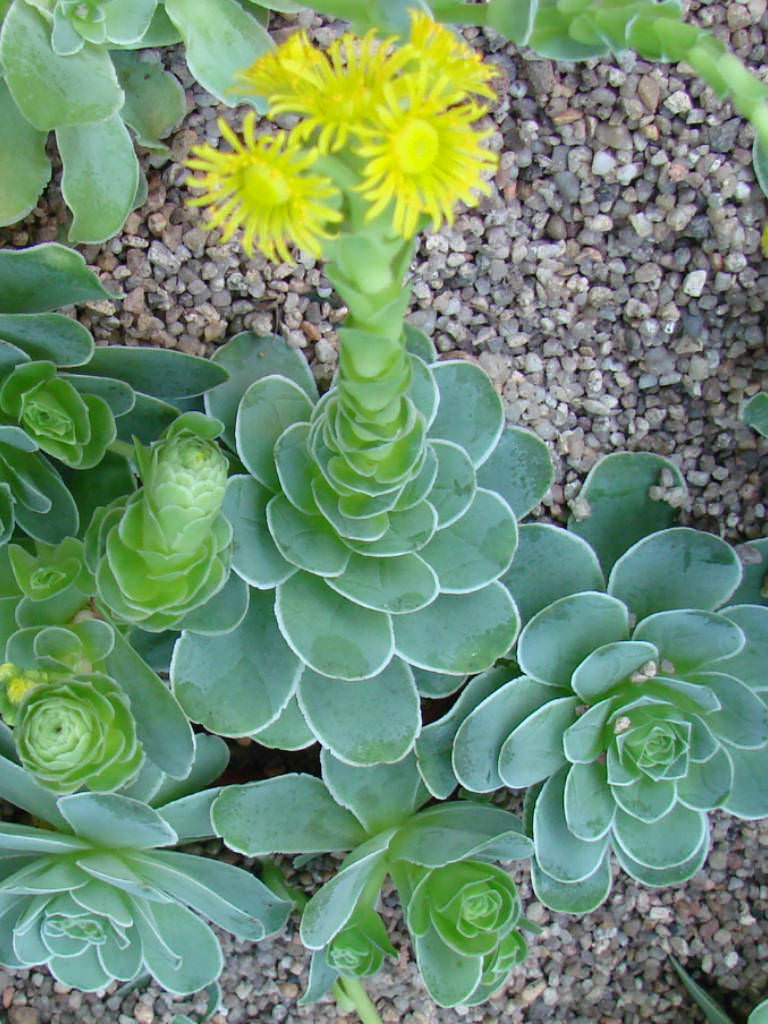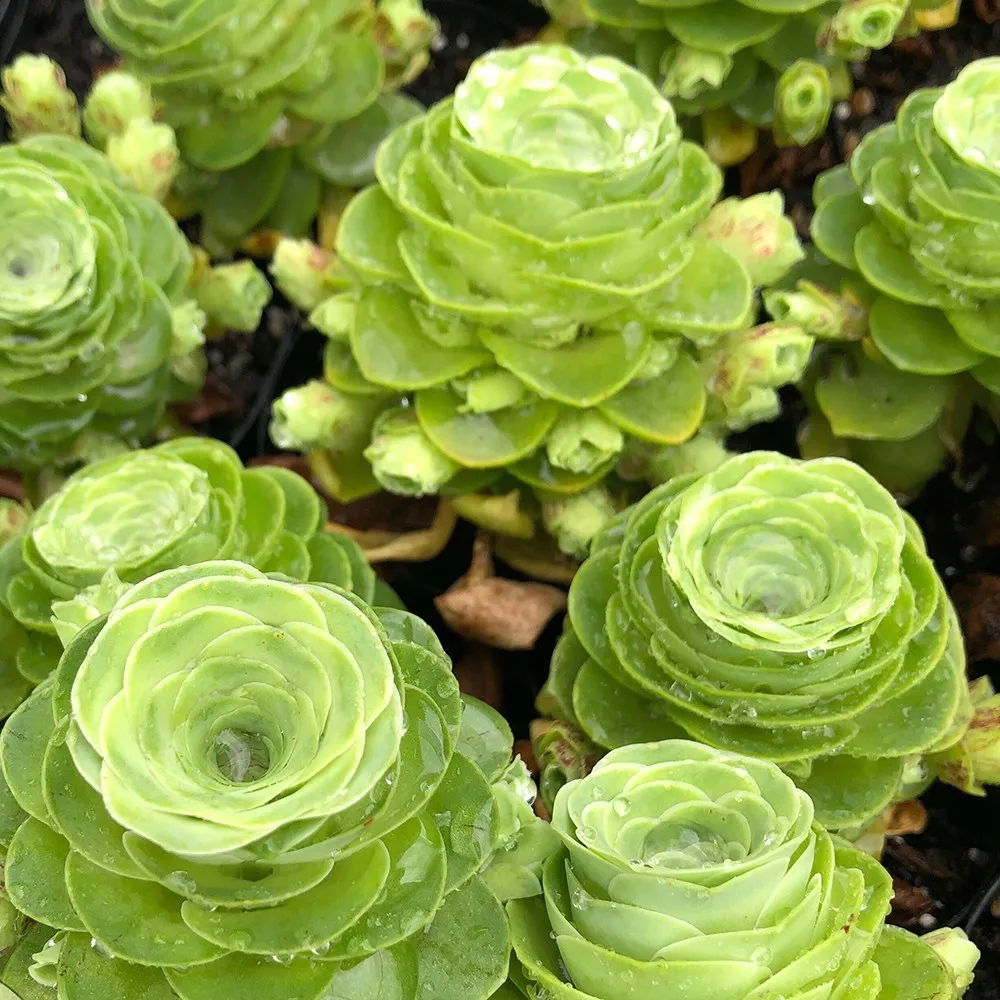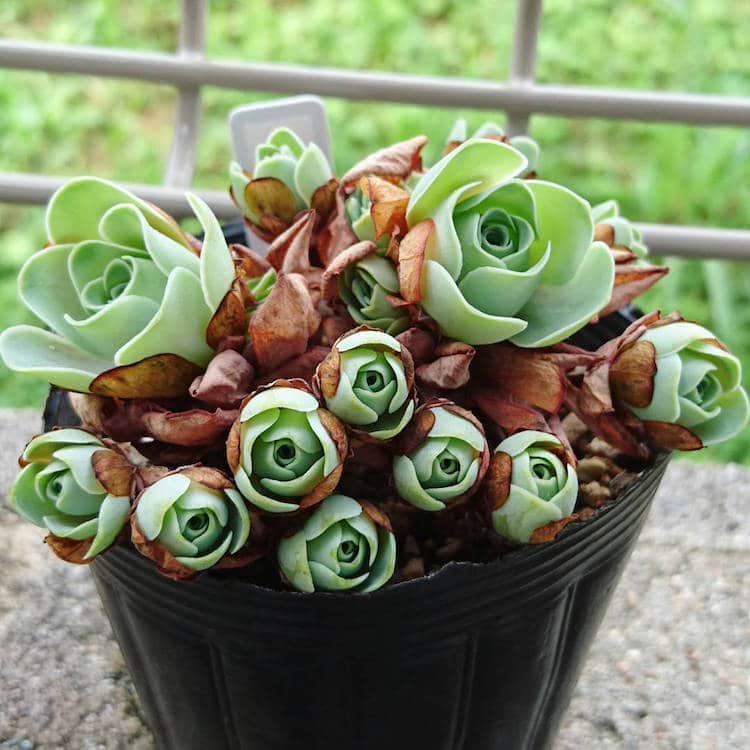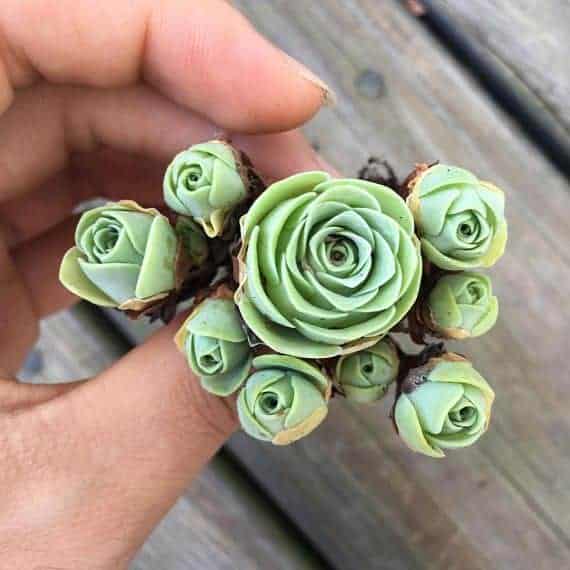
Caring For Greenovia Information And Tips For Growing Greenovia Succulent
Greenovia Dodrantalis succulents exhibit a distinctive rosette shape with densely packed leaves. The leaves are often a silvery-green color and have a velvety texture, giving them a unique appearance that stands out among other succulents. These plants typically grow in a compact manner, forming tight clusters that add a touch of elegance to.

Greenovia Dodrantalis Rare succulents, Planting succulents, Succulent
Kim Chen / Rare_Succulent How to Care for Rose Succulents . Greenovia pink mountain rose is a hardy plant that grows well with a combination of sunlight and shade, and well-drained soil. During their summer dormant season, Baldwin suggests placing rose succulents in bright shade; otherwise, their rosettes will close to conserve moisture and protect their vital cores from sunburn.
.jpg)
150pcs Greenovia Seeds Garden Succulent Plants Potting at Banggood sold out
A 'MUST HAVE' very attractive succulent that forms rosettes of densely packed leaves in symmetrical patterns resembling a rose bud. #Succulent #Greenovia #su.

SucculentGreenovia Diplocycla var.Gigantea/Guarimiar Mountain Etsy
Greenovia aurea: Care and Propagation Guide. Greenovia aurea, also known as Aeonium aureum, belongs to the Crassulaceae family. This succulent plant is native to the Canary Islands and usually grows in clusters and groups, with each plant having a stem or clump that can grow up to 15-17 inches tall. The stem gives way to rosettes of fleshy gray.

Greenovia Diplocycla Gomera 'Green Rose Succulent' Special Deal
Greenovia Aurea succulents need strong light. When planting this succulent type in a garden, make sure it gets sunlight. Full to partial sun is the best for its growth. It is better to grow outdoor rather than indoor. This type of succulent prefers a warm climate. It can survive at zone 10a-11b which is around -1.1°C (30°F). If you live in a.

Greenovia A suculenta que parece uma rosa Clube do Jardim
Description. Aeonium aureum, also known as Greenovia aurea, is an attractive succulent that forms a usually solitary rosette of pale apple-green leaves. The rosette grows up to 10 inches (25 cm) in diameter. Leaves flush out in winter and close up in tight rounded balls in summer. The mature rosette sends up an erect stiff inflorescence of.

Aeonium dodrantale (Greenovia dodrantalis) World of Succulents
Whether your Greenovia dodrantalis is in the ground or in a pot, the watering technique is the same. You want to thoroughly drench the plant and let it sit for a few minutes. However, you should make sure that it is not sitting in water between waterings and discard any water that collects in the saucer. 5.

Hot Sale Real Succulent Plants Greenovia Aurea Aeonium Aureum Buy
Greenovia aizoon is a perennial succulent that forms a clump of tiny, dark green rosettes, with dead leaves persisting on the much-branched very reduced stems. The flowering stem is about 15 cm high, terminating in a flat head of small yellow flowers. Greenovia aurea (Aeonium aureum)

Greenovia aurea Cacti and succulents, Succulent gardening, Planting
5. Greenovia Diplocycla (Aeonium Diplocyclum) Aeonium Diplocyclum, likewise known as Greenovia Diplocycla, is an attractive succulent that forms a solitary monocarpic rosette of glaucous pale green leaves. The rosette grows up to 18 cm in size. The leaves are thick and fleshy, up to 8 cm long and 2.6-6.5 cm wide.

Greenovia Diplocycla Gomera 'Green Rose Succulent' Special Deal
Greenovia succulents will appreciate generous watering sessions throughout their growth period. If the plant is located in a well-ventilated outdoor area, the soil can be soaked thoroughly during each watering session. Make sure the soil is totally dry prior to watering the plant. During winter, the soil may understandably take much longer to.

Rare Succulent Aeonium Greenovia Mountain Rose small cluster Etsy
Greenovia diplocycla 'Gigantea'. As indicated by its common name, this cultivar is known as a giant in the world of succulents. Its sheer mature size can truly set it apart from other Greenovia species. After several years of care, a single 'Gigantea' rosette can grow to 18 inches (46 cm) in diameter!

Greenovia Dodrentalis Succulent Seeds Cactus Kingdom Cacti and Succulents
Greenovia Dodrantalis is a small to medium-sized succulent that can grow up to 15-20 cm (6-8 inches) in height and 10-15 cm (4-6 inches) in diameter. It forms rosettes of soft, velvety leaves that resemble rose petals and can range in color from pale green to bluish-green.

Rose Succulents Look Like Tiny Blossoming Flowers from a Fairy Tale
There are over 60 different families of plants that encompass succulents. Succulents are such a diverse group that you could probably name a shape or form and find a representative succulent. Greenovia succulent is evocative of roses, with similar layered petals and curved form.The rose-shaped succulent called Greenovia dodrentalis is an example of this form and is in the family Crassulaceae.

Rose Succulent Care (Greenovia dodrantalis) Sublime Succulents
Greenovia Aurea is an alluring perennial succulent noted for its stunning rosette form that strikingly resembles a blooming rose. Its leaves are succulent, elegantly curved, and densely packed in a graceful spiral formation. The rosettes are typically about 6 inches in diameter and exhibit a bright green color that might blush to a soft pink.

Greenovia Diplocycla Gomera 'Green Rose Succulent' eSucculent
Greenovia is a small genus that consists of only five species. Some botanists group this genus with Aeonium thus sometimes you may find these plants classified as Aeonium. The succulents naturally occur in the Canary Islands in North Western Africa. The species include Greenovia aizoon (Aeonium aizoon), Greenovia aurea (Aeonium aureum.

Greenovia Succulent Beautiful succulent I have not seen before YouTube
Aeonium dodrantale, also known as Greenovia dodrantalis, is a succulent plant that forms rosettes of pale green densely packed leaves. The rosettes are tightly closed during the summer dormancy. They are cup- or urn-shaped, grow up to 2.4 inches (6 cm) in diameter, and produce offsets on up to 3.2 inches (8 cm) long stalks.